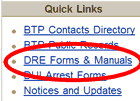![]()

|
Kane, G. The Methodological Quality of Three Foundational Law Enforcement Drug Influence Evaluation Validation Studies. Journal of Negative Results in BioMedicine 2013, 12:16. doi:10.1186/1477-5751-12-16, 4 November 2013. |
Free full text pdf, at the web site of the Journal of Negative Results in Biomedicine |
![]()
|
Bigelow, G. E., et al. Identifying Types of Drug Intoxication: Laboratory Evaluation of a Subject-Examination Procedure. DOT HS 806 753, NHTSA, 1985. Aka the Johns Hopkins DIE validation study |
1 MB, OCRed |
|
Compton, R.P. Field Evaluation of the Los Angeles Police Department Drug Detection Program, Report number DOT HS 807 012, Office of Driver and Pedestrian Research, NHTSA, 1986; aka, the LAPD 173 NHTSA Technical Report |
2.2 MB, OCRed |
|
Adler, E., Burns, M. Drug Recognition Expert (DIE) Validation Study; Final Report to Governor's Office of Highway Safety State of Arizona, AZ DOT,1994. Aka the Arizona DIE validation study |
2.6 MB, OCRed |
|
Dr. Jack Richman's deposition in the Vermont civil case Sukoc v Carlson. Dr. Richman, the police / defense expert in this civil case, was for many years the "medical expert" of the International Association of Chiefs of Police's Drug Evaluation and Classification Program's Technical Advisory Panel. The DECP TAP is said to keep police Drug Recognition Expert training up to date in accordance with the world's scientific literature. |
![]()
 NHTSA
SFST and DRE Training Manuals at Washington
State Patrol. (Look on the right for Quick
Links, and DRE Forms and
Manuals.)
NHTSA
SFST and DRE Training Manuals at Washington
State Patrol. (Look on the right for Quick
Links, and DRE Forms and
Manuals.)
National
Academy of Sciences: Strengthening Forensic
Science in the United States

